*This post contains affiliate links, and we will be compensated if you buy after clicking on our links.
This is our comparison of ClickFunnels vs Shopify online business platforms.
As business owners we have worked extensively with both of these solutions. Our reviews are base on our own experience as well as other users experience.
Our Recommendation ClickFunnels vs Shopify
1. ClickFunnels
2. Shopify
In the comparison we have compared ClickFunnels vs Shopify to see which is the best to solution for your business.
Both solutions are good and market leads in their own areas.
Insert comparison table
Whether you choose ClickFunnels vs Shopify will very much depend on your business needs.
The best solution for online stores is a Shopify store. Sign up for a free trial and $1 per month for three months plan here.
The best solution for businesses that are not e-commerce stores is ClickFunnels. Sign up for a free 14 day trial here.
However this will depend on your business needs and the way you generate sales and leads. This is discussed in the detailed comparison below.
Details ClickFunnels vs Shopify
Comparing ClickFunnels

ClickFunnels is an easy to use drag and drop funnel builder with many other functions designed to automate the process of turning traffic into leads and leads into sales in an all in one platform.
It was revolutionary when it first came out. More recently there have been a number of imitations but few come close in terms of the functionality and ease to create funnels.
Features of ClickFunnels
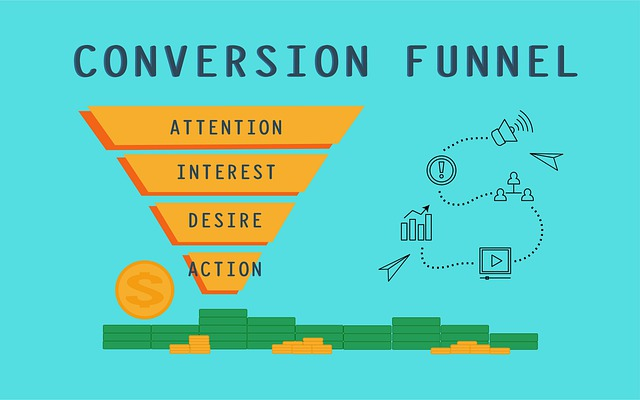
ClickFunnels offers a very wide range of features that streamline the marketing and sales process for online businesses. These include:
Sales Funnels – convert visitors into potential customers with high converting sales funnels
Websites and web pages – Create professional websites that convert
Online courses – Turn your knowledge and passions into revenue
Email Marketing – Engage and sell to your audience with follow up funnels
Workflows – Automate your marketing
Landing Pages – Create landing pages for your funnels and websites to acquire new customers
Membership Sites – Generate recurring revenue
Global Products – Create products once sell it across all your pages and funnels
A/B Testing – Test and optimise your website, funnels and email campaigns
Blog – Share your knowledge and expertise
Customer Center – Provide excellent customer service for your customers with their own personal customer center
Analytics – Visibility of your business data
ClickFunnels Editor – Easy drag and drop page editor
CRM – Coming soon
Ecommerce store – Coming soon
Shopping Cart – Coming soon
With all these tools in one place, ClickFunnels simplifies the process of creating high converting funnels and landing pages, setting it apart from other marketing platforms.
Who is ClickFunnels for?
In short it is for any business that wants more sales and leads. It is particularly effective for the following businesses:
Consultants
Coaches
B2B lead generation
Local small businesses
Information or digital products
Affiliate Marketing
Agencies
Freelancers
Network Marketing
Start ups and new business owners
E-commerce with a limited number of products. Multi SKU e-commerce businesses are more suited to Shopify or using ClickFunnels integrated with a Shopify store.
ClickFunnels Limitations
Clickfunnels 1.0 (classic) had very slow page load speeds. However the new version Clickfunnels 2.0 has been built from scratch and has been designed to load faster.
The owner Russel Brunson is very charismatic and energetic. He is very knowledge about marketing and what works. He has created a very strong community and tribe with a strong identity. Whilst his style appeals to many people it does not appeal to everyone and can put some people off.
Whilst this is one of the easiest tools to build funnels and websites out there is still a learning curve to using this technology. It will take learning and practice to be proficient at building funnels and websites in ClickFunnels. There is a lot of useful training in how to use ClickFunnels provided for free. You can also buy pre- made templates to fast track your sales funnel building process or get someone to build them for you.
Some people are put off by the price. This might seem high but when you consider all of the functionality you get and the power of ClickFunnels it is relatively good value.
ClickFunnels Reviews
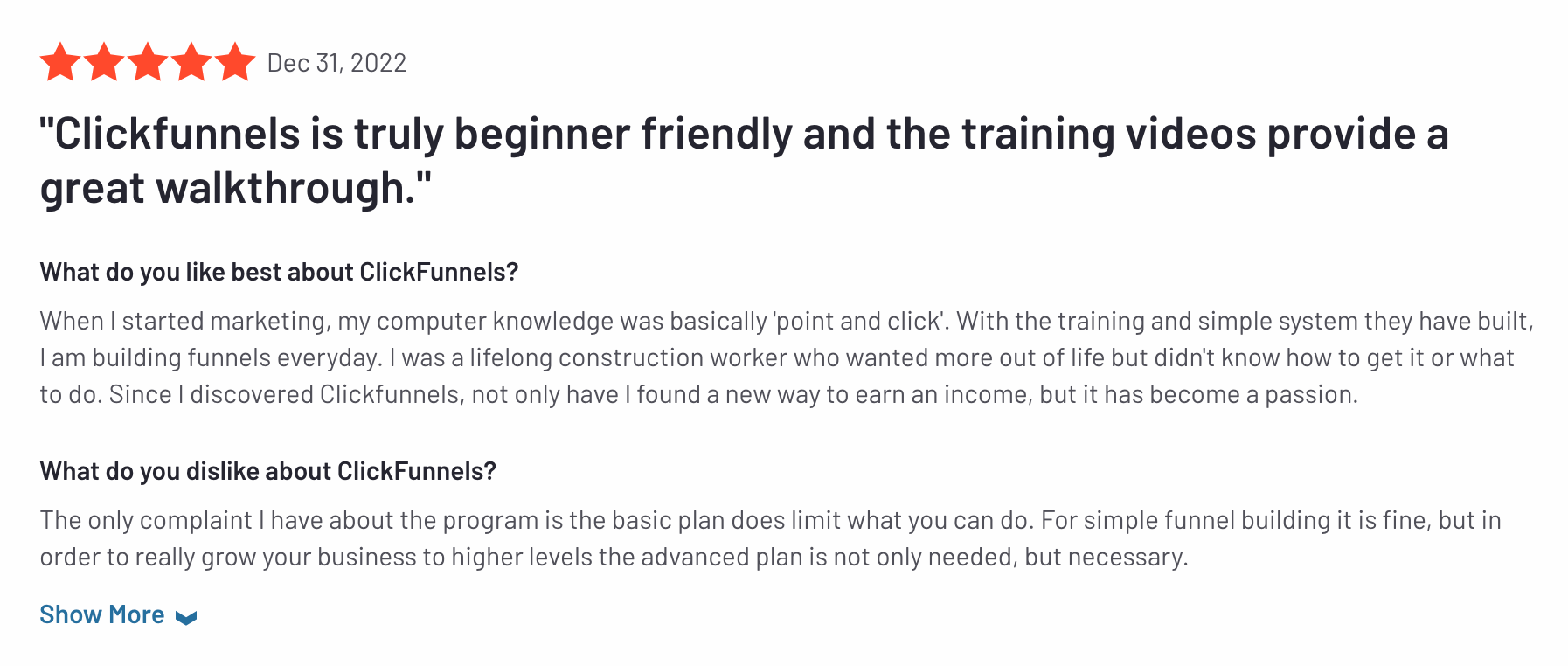
ClickFunnels have an average of 4.6 out of 5 for ClickFunnel reviews on G2. The majority of ClickFunnels customers are very happy with the service have experienced great customer service.
ClickFunnels Pricing and Plans
ClickFunnels offers a 14 day free trail so you can test drive ClickFunnels to see if it is the right solution for you.
ClickFunnels offers three pricing tiers ranging from $127 to $208 per month offering access to different levels of functionality.
ClickFunnels Pricing Plans
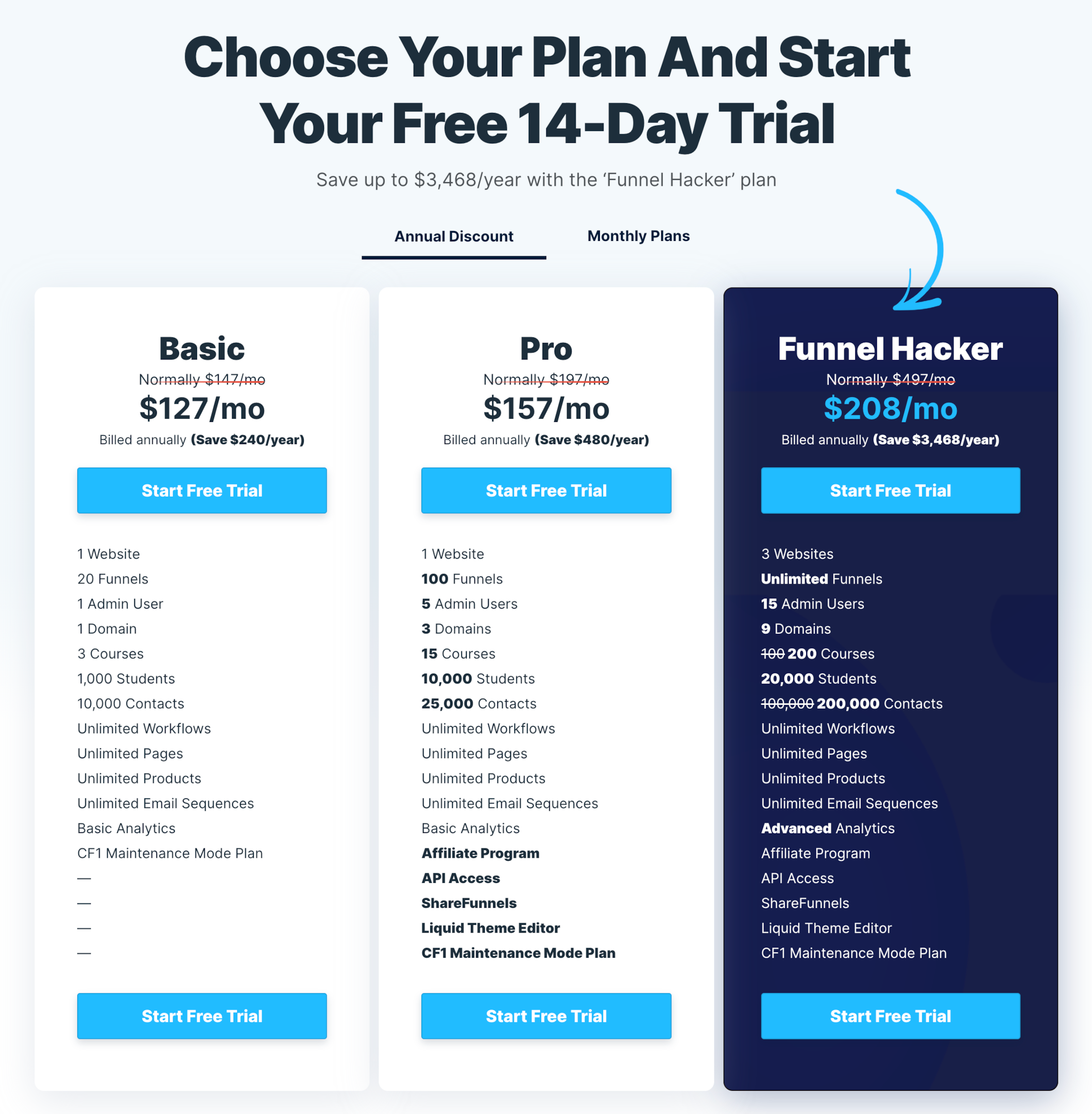
Sign up for a free 14 day trial here.
Comparing Shopify

Shopify, on the other hand, is a comprehensive e-commerce platform with a content management system designed to efficiently manage your online store. Shopify is known for its user-friendliness and robust features, Shopify is ideal for both new and established businesses looking to create and manage an online store with ease.
With a wide range of features Shopify has become a popular choice among e-commerce entrepreneurs.
Features of Shopify

Shopify is an e-commerce platform that allows individuals and businesses to create and manage online stores. You can also build Shopify sales funnel. Below are some of it features:
– Ease of Use: Shopify is known for its user-friendly interface, which makes it easy for users to set up and manage their online store even without technical expertise.
– Customizable Themes: Shopify offers a variety of professional themes that users can customize to match their brand identity.
– App Store: Shopify has an extensive app store where users can find and install additional features and integrations to enhance their store.
– Payment Gateways: Shopify supports a wide range of payment gateways, allowing merchants to accept payments from customers in various forms.
– Security: Shopify is a hosted platform, and it takes care of security compliance, ensuring that the stores are protected against threats.
– Scalability: As your business grows, Shopify can handle increased traffic and sales, ensuring your store remains fast and reliable.
– Mobile Responsiveness: Shopify themes are mobile-responsive, which means they automatically adjust to fit the screen size of the device being used.
– Marketing Tools: Shopify provides marketing tools including SEO features, email marketing integration, and social media integration to help store owners promote their products and build an online sales funnel.
– Multichannel Selling: Merchants can sell their products not just on their store but also on other platforms like Amazon, eBay, and social media through integrations.
– Inventory Management: Shopify has built-in inventory management features that allow store owners to track stock levels and manage their products.
– Shipping: Shopify offers shipping options and integrations with major shipping carriers, allowing for easy management of shipping rates and labels.
– Analytics and Reporting: Shopify offers comprehensive analytics and reporting tools that allow store owners to track sales, traffic, and other important metrics.
– Point of Sale (POS): Shopify POS allows merchants to sell in-person with POS hardware and sync sales data with their online store.
– Customer Support: Shopify provides 24/7 customer support through various channels like phone, email, and chat.
– Languages: Shopify supports multiple languages, allowing store owners to cater to a global audience.
– Gift Cards and Discount Codes: Shopify allows merchants to create and manage gift cards and discount codes to incentivize purchases.
– Abandoned Cart Recovery: Shopify can send automated emails to customers who leave the checkout process before completing their purchase.
– Blogging Platform: Shopify includes a blogging platform that can be used to create blog posts, which is essential for content marketing and SEO.
Who is Shopify for?
Shopify is a versatile ecommerce platform that can cater to a wide range of online businesses. Here are the types of businesses and scenarios for which Shopify is particularly well-suited:
Small to Medium-sized Businesses: Shopify is ideal for small to medium-sized businesses that want to start selling online without the need for extensive technical knowledge.
Entrepreneurs and Startups: Individuals who are just starting out and want to test their business idea can benefit from Shopify’s ease of use and relatively low start-up costs.
Dropshipping Businesses: Shopify integrates well with dropshipping solutions like Oberlo, making it a popular choice for entrepreneurs who want to start a dropshipping business without holding inventory.
Brick-and-Mortar Stores Going Online: For physical retailers looking to expand their presence online, Shopify’s Point of Sale (POS) system allows for seamless integration between in-store and online sales.
Merchants with Limited Customization Needs: Businesses that do not require highly customized storefronts and are content with the customization options provided by Shopify themes and apps.
Businesses Focused on Physical Products: Shopify is particularly strong for businesses selling physical goods, as it offers inventory management, shipping integration, and other relevant features.
Pop-up Shops: For businesses that operate pop-up shops, Shopify’s POS system is handy for processing transactions and managing inventory on the go.
Merchants Looking for a Hosted Solution: Businesses that prefer not to deal with the technical aspects of hosting an online store can benefit from Shopify being a fully hosted platform.
Niche Product Sellers: Businesses selling niche products can take advantage of Shopify’s simple setup to quickly create a specialized store.
Businesses that Rely on Content Marketing Less: Shopify is a good fit for businesses whose primary focus is on selling products rather than content marketing, as Shopify’s blogging and content management features are somewhat limited compared to specialized content management systems.
Seasonal Stores: For businesses that only operate during certain seasons (e.g., holiday-themed products), Shopify’s monthly subscription model allows for the store to be active only when needed.
While Shopify is suitable for a wide range of businesses, it’s important for merchants to assess their specific needs, budget, and long-term goals to determine if Shopify is the best fit for their ecommerce business.
Limitations of Shopify
While Shopify is a popular and powerful ecommerce platform, it also has certain limitations:
Transaction Fees: If you don’t use Shopify Payments, Shopify charges additional transaction fees on every sale. This can add up and become costly for some merchants.
Limited Customization: Although Shopify offers customization through themes, it can be limiting for those who want more control over the look and feel of their store. The proprietary language, Liquid, can be a barrier for those not familiar with it.
Costs can add up: The basic cost of Shopify might seem reasonable, but adding additional apps and features can significantly increase the monthly expenses.
Content Limitations: Shopify’s blogging and content management features are not as robust as specialized content management systems like WordPress. This can make it less ideal for stores with heavy content marketing needs.
URL Structure: Shopify’s URL structure is not fully customizable, which can be a drawback for SEO.
Internationalization: While Shopify supports multiple languages, managing a store in multiple currencies and languages can be cumbersome.
Lack of Cross-border Ecommerce Features: For merchants serving international markets, Shopify might not offer enough cross-border ecommerce features such as multi-currency pricing or localized payment options.
Product Options Limitations: Shopify limits the number of product variants (e.g., size, color) you can have, which can be restrictive for stores with a wide range of products.
Migration Challenges: If you ever decide to move your store away from Shopify, migrating your store can be complicated and time-consuming.
Limited Payment Gateway Options in Some Countries: While Shopify supports a wide range of payment gateways, the options might be limited in some countries, forcing merchants to use gateways that might not be ideal for their customer base.
App Dependency: Sometimes, to get the functionality you need, you may have to rely on third-party apps. This can cause issues if the app is not well-supported or compatible with other apps you are using.
It’s important for merchants to carefully consider these limitations and weigh them against the benefits before choosing Shopify or any other ecommerce platform. The right choice depends on the specific needs and priorities of the business.
Shopify Reviews
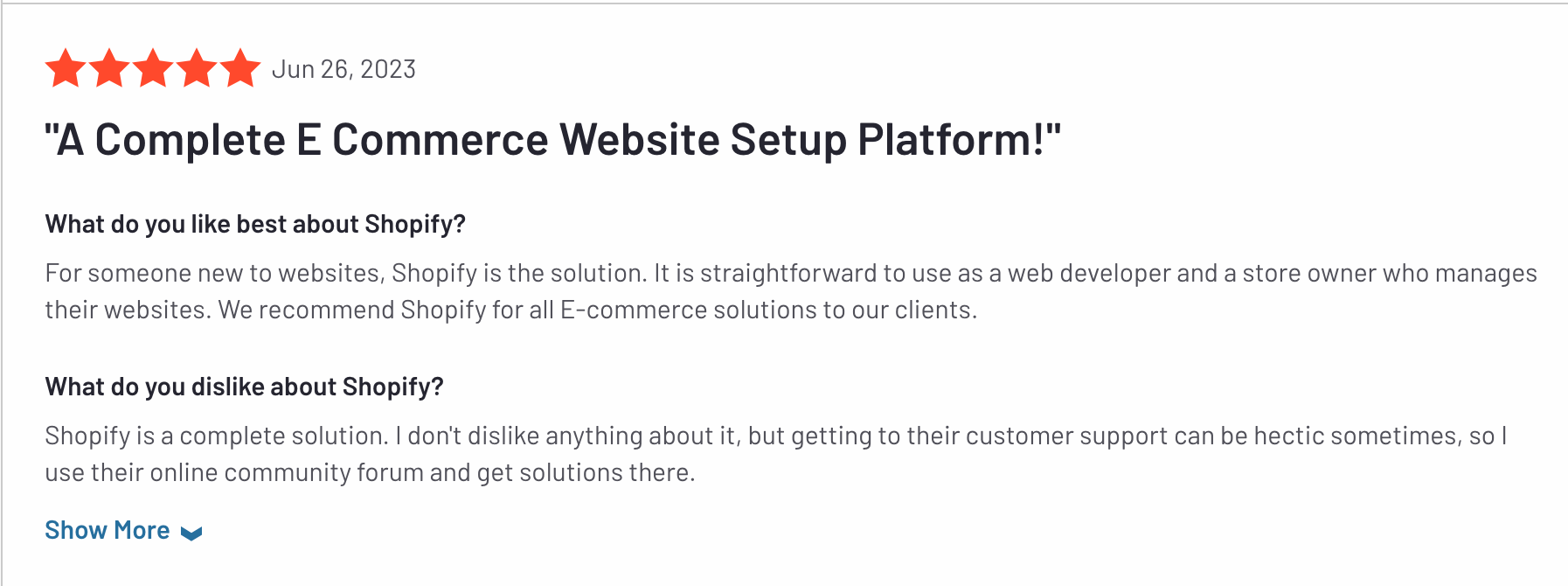
Shopify have an average of 4.4 out of 5 for Shopify reviews on G2. The majority of Shopify customers are very happy with the service.
Shopify Pricing and Plans
Shopify has a free trial and a plan for a $1 a month for 3 months so you can test it at no risk to see if it is the right solution for your business. Sign up here.
Shopify provides a variety of pricing plans to accommodate different business requirements ranging from $29 to $299 per month.
Shopify Pricing Plans
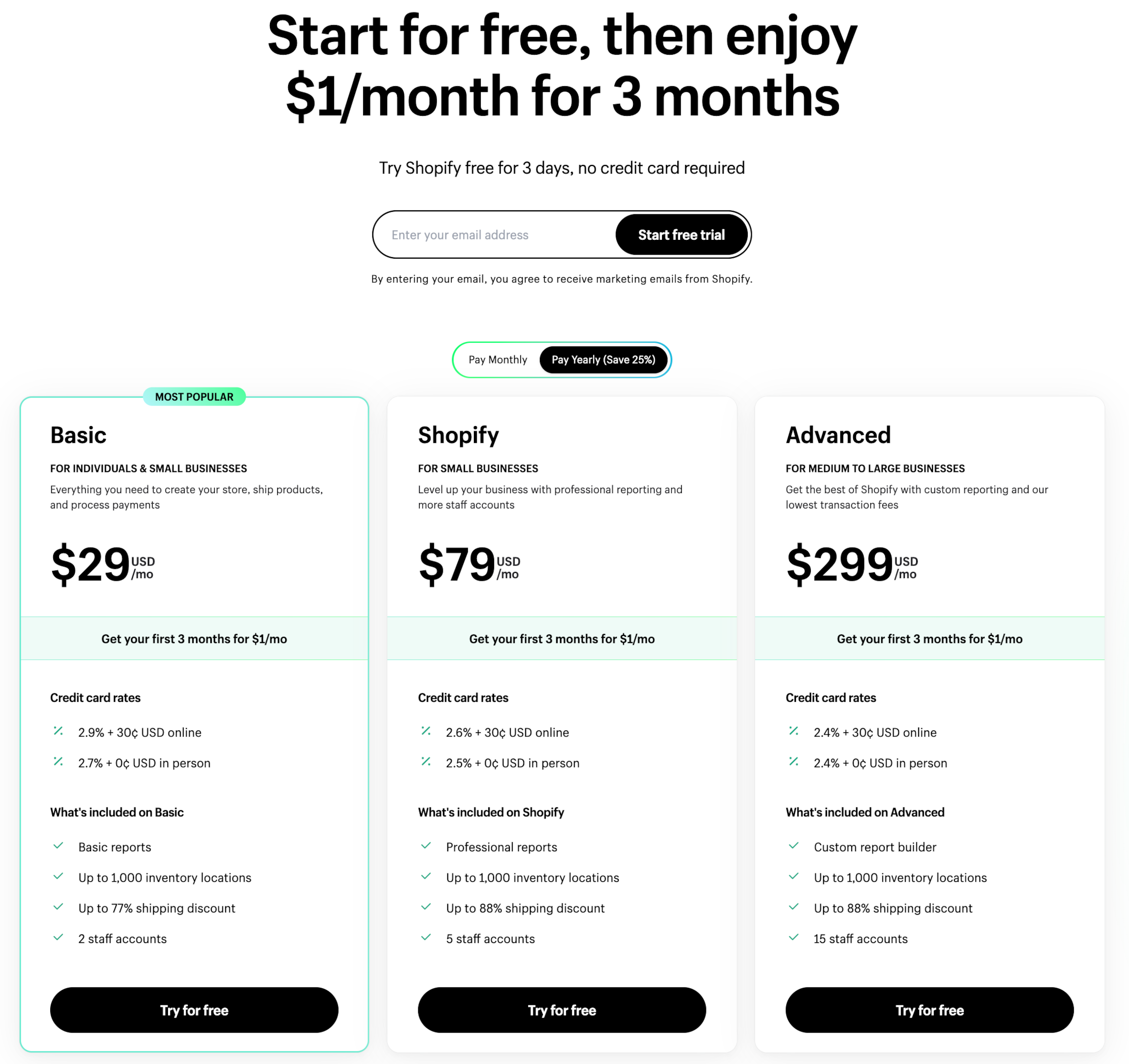
Comparing ClickFunnels vs Shopify: Key Differences
When comparing ClickFunnels vs Shopify, it’s essential to understand the key differences between the two platforms. While both offer tools and features designed to help businesses succeed online, their primary focus and range of marketing and sales features differ significantly.
ClickFunnels is a sales funnel builder that helps businesses create and optimize their funnels. It offers a range of features designed to help businesses increase conversions, including customizable templates, A/B testing, and more.
Shopify is an online e-commerce store.
Sales Funnel vs. Online Store
ClickFunnels is best suited for businesses that need sales funnels and lead generation, as it offers a comprehensive range of marketing and sales features, such as pre-built funnels and in-depth analytics. This platform is ideal for organizations looking to optimize their sales process and maximize conversions.
On the other hand, Shopify is designed for creating and managing online stores, with features such as inventory management, online store building and checkout page. This makes Shopify the perfect choice for businesses looking to establish a robust e-commerce presence and efficiently manage their inventory and orders.
Your choice of ClickFunnels vs Shopify will very much depend on your business’ specific needs and goals.
Marketing and Sales Features
When it comes to marketing and sales features, ClickFunnels offers a more comprehensive range of tools and options compared to Shopify. With features like ready-made funnels, comprehensive analytics, and the ability to create custom landing pages, ClickFunnels provides businesses with everything they need to optimize their marketing efforts and drive sales, including an effective sales page for their sales pages.
In contrast, Shopify focuses primarily on e-commerce capabilities and provides a streamlined platform for businesses to create and manage their online stores. While it does offer some marketing and sales features, its primary strength lies in its robust e-commerce tools and features.
Your choice of ClickFunnels vs Shopify will depend on whether you need an online store or not.
Integration Possibilities: Combining ClickFunnels and Shopify
For businesses seeking a comprehensive solution for both marketing and e-commerce management, integrating ClickFunnels and Shopify can provide the best of both worlds. This way you do not need to make a decision on ClickFunnels vs Shopify you can use them both for their relevant functions and strengths.
By combining the powerful marketing and sales features of ClickFunnels with the robust e-commerce capabilities of Shopify, businesses can streamline their processes and boost their online performance.
With this integration, businesses can create and manage their entire customer acquisition and fulfilment from one platform, eliminating the need to switch between multiple tools. They can also take advantage of Shopify’s powerful e-commerce features, such as product management and inventory tracking.
How to Integrate ClickFunnels and Shopify
Integrating ClickFunnels and Shopify through the ClickFunnels – Shopify integration is a relatively simple process that involves connecting the two platforms and installing the necessary apps. To begin, log in to your Shopify account and access the Integrations menu located in the Account Menu. From there, you can connect your Shopify account to your ClickFunnels account and begin the integration process.
Once connected, you can transfer orders directly to your Shopify account from your ClickFunnels account, review various landing pages and promotional items, and utilize Shopify to process and fulfil orders efficiently.
Benefits of Integrating ClickFunnels and Shopify
Integrating ClickFunnels and Shopify offers a wide range of benefits for businesses. One of the main advantages is the ability to simplify and streamline processes, which can save time and effort for business owners. Custom landing pages created through ClickFunnels can be linked to Shopify products, allowing for a smooth customer journey from browsing to purchasing.
Another significant benefit of integration is the potential for boosted conversion rates and better tracking of individual product sales. By combining the powerful marketing features of ClickFunnels with the comprehensive e-commerce capabilities of Shopify, businesses can achieve greater success and drive more sales than ever before.
Alternatives to ClickFunnels and Shopify
So far we have just looked at ClickFunnels vs Shopify. However for businesses exploring other options in marketing and e-commerce platforms, there are several alternatives to ClickFunnels and Shopify.
Some popular alternative automated marketing, page building and email platforms include Profit Voyager, Leadpages, Kartra, GetResponse, Instapage, Unbounce, Landingi, ActiveCampaign for Marketing, and HubSpot Marketing Hub.
In the realm of e-commerce platforms, businesses can consider alternatives such as BigCommerce, WooCommerce, Magento, Wix, and Squarespace. Each platform offers its own unique features, pricing, and integrations, so it’s essential to evaluate the various options and determine which platform is the best fit for your business.
Overall Winner ClickFunnels vs Shopify

In conclusion, both ClickFunnels and Shopify offer powerful tools and features designed to help businesses succeed online. Both can create high converting sales page for your business. The choice between the ClickFunnels vs Shopify ultimately depends on your specific needs and goals.
ClickFunnels is best suited for businesses focused on funnels and lead generation. Sign up for a free 14 day trial with ClickFunnels here.
Shopify excels in e-commerce and online store management. Shopify has a free trial and a $1 a month for three months plan. Sign up for the free trial here.
If you require both functions you can use both software services and integrate ClickFunnels with Shopify.
1. ClickFunnels
2. Shopify
Frequently Asked Questions
Does Shopify have a funnel builder?
Yes, Shopify does have a funnel builder. This powerful tool enables users to create custom marketing funnels within their own Shopify domains using pages such as “Free + Shipping” offers, lead magnets, and long-form sales pages.
These pages can be used to capture leads, drive sales, and increase customer loyalty. Shopify’s funnel builder also allows users to customize their funnels. However it does not have the same functions as the marketing funnel in ClickFunnels.
Is ClickFunnels worth the money?
Overall, the features ClickFunnels has to offer are worth the money if you’re serious about building your own online business.
Its drag-and-drop builder simplifies creating sales funnels and allows you to quickly launch a highly effective marketing funnel in no time.
Can I use ClickFunnels for dropshipping?
Yes, you can use ClickFunnels for dropshipping. It provides users with a powerful sales funnel that can quickly and easily capture customer data and automate the process of fulfilling orders.
Additionally, integration with third-party applications makes it easy to manage shipping needs.
Is ClickFunnels like Shopify?
No, ClickFunnels and Shopify are not the same – while Shopify is an e-commerce platform designed for online stores, ClickFunnels is a sales funnel builder that helps you build sales pages and generate leads.
However, both tools have their advantages and can be used to grow your business. You can integrate Shopify with ClickFunnels for to get the benefits of both.
What is the primary focus of ClickFunnels?
ClickFunnels’ primary purpose is to make sales and marketing easier, allowing users to create effective sales funnels with automated features and analytics tools.
These features make it easier to track and optimize your customer acquistion, allowing users to maximize their profits.
The platform also offers a range of templates and drag-and-drop tools to make creating sales funnels even easier.

